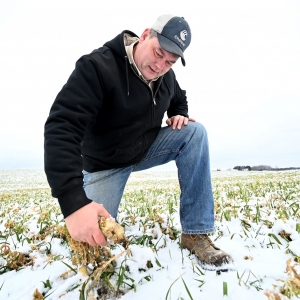The Stream, March 9, 2021: Carbon-Negative Crops Could Lead to Mass Water Shortages
YOUR GLOBAL RUNDOWN
- New research finds that growing more carbon-negative crops could cause water shortages for billions of people globally.
- The Canadian government isn’t tracking water-related illnesses in First Nations communities.
- Environmental officials in West Virginia investigate acidic discharge from a former mine complex.
- Egyptian and Sudanese officials agree to resume talks with Ethiopia over the Grand Ethiopian Renaissance Dam.
The Nevada Supreme Court holds a public hearing to discuss adopting a commission on complex water cases.
“While water law is a challenging, complex and infrequently agreed upon subject in our law, what was a consistent theme in all of the conversations that I have had was the perceived benefits of a study that would look at how the judicial system adjudicates water law matters in the future.” – Nevada Supreme Court Chief Justice James Hardesty. The Associated Press reports that the Nevada Supreme Court held a public hearing on a petition to create a water law commission. The commission would study how water cases in the state are decided. Similar courts have been established in Colorado, New Mexico, Idaho and Montana. Most of the comments heard during the hearing supported re-examining how the state’s courts handle water law established a century ago, but the court did not vote on any proposals.
IN RECENT WATER NEWS
Water, Texas reports about the state’s vulnerability to a changing climate and the government’s uncertain capacity to adjust.
A deep freeze confirmed that finding in early 2021. The freeze caused power failures and severe water shortages across all of Texas.
The story of water in Texas is the state’s devout allegiance to the principle that mankind has dominion over nature. Climate disruption, along with booming population and economic growth, is writing a much different story of vulnerability — to nature’s bullying and to the government’s uncertain capacity to adjust.
In Case You Missed It:
HotSpots H2O: Canadian Government Misses Target to End Water Insecurity for First Nations Communities – Many First Nations in Canada continue to live without clean water six years after the government began actively addressing the issue, according to a report published by the Auditor General of Canada late last month.
What’s Up With Water – March 8, 2021 – This week’s episode covers winter storms that crippled the water system in Mississippi’s capital, legal status equivalent to a person granted to the Magpie River in Canada and a new report that finds economic benefits for reducing the strain on the world’s fresh water.
Drinking Water-Related Illnesses Among First Nations Communities Aren’t Tracked By Canadian Government
Pique Newsmagazine reports that the Canadian government failed to track and study water-related illnesses in First Nations communities. First Nations have long suspected a number of health issues in their communities could be attributed to a lack of clean drinking water, but a robust level of research on the issue is absent as well. Some critics suspect the “blackhole” of data is intentional, in order for the government to avoid responsibility.
TODAY’S TOP WATER STORIES, TOLD IN NUMBERS
6,200 GALLONS
The West Virginia Department of Environmental Protection said Friday that they are investigating the cause of a stream discharge that is 10 times as acidic as normal concentrations. The discharge came from the former T&T Mine Complex and peaked at 6,200 gallons (23,470 liters) a minute on Thursday afternoon, the Associated Press reports. The leak overwhelmed capabilities of the water treatment plant and an estimated 300 to 500 gallons per minute were not being treated.
4.5 BILLION PEOPLE
New research from Nature Communications found that a massive expansion of carbon-negative crops could cause water shortages for than 4.5 billion people globally. The study evaluated potential side effects from bioenergy with carbon capture and storage (BECCS), a technology that would help grow crops and trees that absorb CO2 and capture the carbon released when the crops are burned for energy. Researchers from the Potsdam Institute for Climate Impact Research in Germany found that water stress would expand to previously unstressed parts of the world, including parts of South America and southern Africa, due to the need for new BECCS crop plantations.
ON THE RADAR
Egyptian President Adbel Fattah el-Sisi visited Sudan to discuss future negotiations with Ethiopia over the Grand Ethiopian Renaissance Dam, Al Jazeera reports. During the visit, President el-Sisi warned against Ethiopia continuing to fill the dam’s reservoir on the Blue Nile River. Egypt and Sudan agreed to return to negotiations to achieve a “fair, balanced and legally binding” agreement on filling and operating the dam.
Jane is a Communications Associate for Circle of Blue. She writes The Stream and has covered domestic and international water issues for Circle of Blue. She is a recent graduate of Grand Valley State University, where she studied Multimedia Journalism and Women, Gender and Sexuality Studies. During her time at Grand Valley, she was the host of the Community Service Learning Center podcast Be the Change. Currently based in Grand Rapids, Michigan, Jane enjoys listening to music, reading and spending time outdoors.







Leave a Reply
Want to join the discussion?Feel free to contribute!